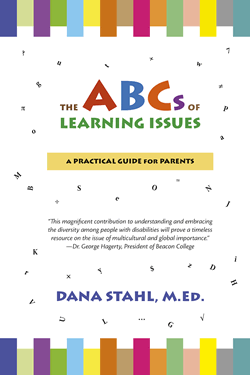BOOK REVIEW
Learning Issues in a Parent’s Terrain
By Karen Kraskow
 The ABCs of Learning Issues
The ABCs of Learning Issues
By Dana Stahl, M.Ed.
Palmiche Press; 188 pages; $39.99
When we all started school we were taught the ABCs (or the equivalent in other languages). At later points in life we needed other kinds of ABCs though we didn’t call them that. We learned to ride a bicycle, to read a map, to navigate the subways, to drive a stick shift... But for some things there’s no guide. We just arrive at the scene and have to act. We just hit the ground, run, and are called on to face the challenge with love and courage.
One of those tasks that comes to us is on the day when our child exhibits behaviors around the learning experience that are perplexing, perhaps troublesome, and don’t give us confidence that our child will learn to his or her potential. Dana Stahl, M.Ed., an educational diagnostician with over thirty years experience, has given us the ABCs.
Her book (entitled The ABCs of Learning Issues) helps parents to navigate the rocky terrain of behaviors surrounding learning issues. It also provides a language discussion of the terms used when seeking the professional assistance of teachers, psychologists, OTs, PTs, pediatric neurologists, speech pathologists, etc. Moreover, she goes over the terminology used in educational evaluations and in teaching strategies recommended for use outside of school.
She provides information that might be a support to parents when they prepare for parent-teacher conferences or Department of Education committee meetings (such as the Committee for Special Education). Some of the topics include the following:
• Receptive Language
• Processing Speed
• Anxiety with Regard to Performance
• Anxiety with Regard to Transitions
• Decoding Skills
• Reading Comprehension
• Working Memory
• Executive Functioning Skills
Within each topic, she parses the behaviors one might observe, with whom one might consult to assist in dealing with them, what teaching strategies are suggested for use in the school environment, and what approaches might work at home.
Let’s take the section on Executive Functioning Skills. The Clinical Definition, apart from pointing to the cognitive processes that must be coordinated to control one’s behavior to achieve a goal, cites the part of the brain that comes into play — the frontal lobe. A more basic definition, one more down to earth, tells us that executive functions help us pay attention, hold onto information we need, block out that which we don’t need, organize our effort, and initiate those actions which bring our work to completion. If executive functions are not in play together, your child — or adult — may work in a scattered manner, forget the order of activities, be lax in sustaining attention and not get the job done in the time allotted. Professionals (learning specialists, teachers, parents) can create structure with the cooperation of the child or adult, help make an outline or suggest sequential steps with a logical order, and suggest the use of apps or calendars that are designed to help manage time.
Lastly, Stahl provides additional support such as a draft of a sample parent letter to the school to help initiate a discussion about the issues of concern to both parties, a glossary of education terms written for the layperson, and a compilation of community organizations that have experience in providing information and assistance in learning difficulties. Definitely this ABCs provides a plethora of resources to guide us through the terrain when we confront the challenge of parenting a child who though bright, creative, and loved, needs a “different way to learn.” #
